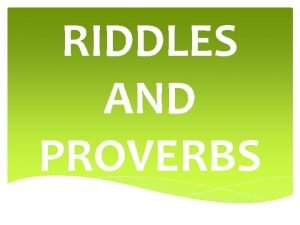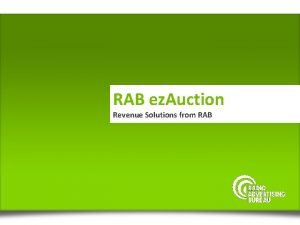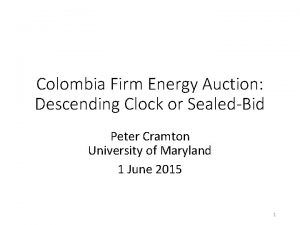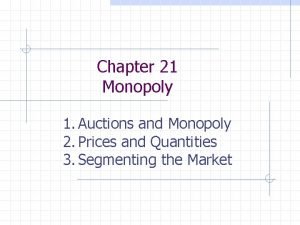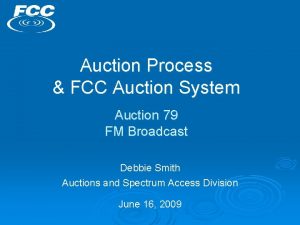Auction Types of Auction p Open outcry n









- Slides: 9

Auction

Types of Auction p Open outcry n n p English (ascending) auction Dutch (descending) auction Sealed bid n n First-price Second-price (Vickrey) Equivalence in these auctions? p Common-value auction p Private-value auction p

p The winner’s curse When one places a bid (say $b) in a common-value auction and is accepted, the value to the seller’s must be less than $b (0 -b). Otherwise the item will not be sold. The common value is probably about $b/2 given the average is an unbiased estimate. (Note: everyone’s estimate is private information. )

Auction and incomplete information p In the private-value auction, every bidder has private information about her evaluation on the item sold. n Ex: vi~U(0, 1), i. i. d. bidders are risk neutral

Bidding Strategy p First-price n n n Bidder with higher valuation will bid higher Given your evaluation is highest, expectation of the 2 nd highest valuation Ex: if one’s valuation is x, then bids (n-1)x/n

p Second-price n n p The bidder will bid truthfully her evaluation on the item. Truthfully bidding is a weakly dominant strategy. Revenue Equivalence Principle n n The seller will collect the same amount from either 1 st-price of 2 nd-price auction. Assumptions of independence, identical distribution, risk neutral matters.

p All-pay auction n n Every bidder pays a sunk (unrecoverable) cost of her bid, and the one with the highest bid wins the item. Ex: Olympic games, political lobbying, R&D races Equilibrium bidding strategy must be a mixed strategy. p Consider a common-value all-pay auction with prize worth 1. p

Bid x in (0, 1) will be continuous p Let P(x) be the equilibrium cdf, the probability one’s bid is not higher than x. p Indifference principle n-1 p Bidding x: [P(x)] -x p Bidding 0: 0 1/(n-1) p → P(x)=x p When n=2, P(x)=x p n A uniform distribution for pdf of x

p When n=3, P(x)=x n 1/2 X=1/4, P(x)=1/2, ½ of chance the bid will be lower than 1/4 p As n increases, it’s more likely to bid lower. p Expected payment is 1/n for everyone.
